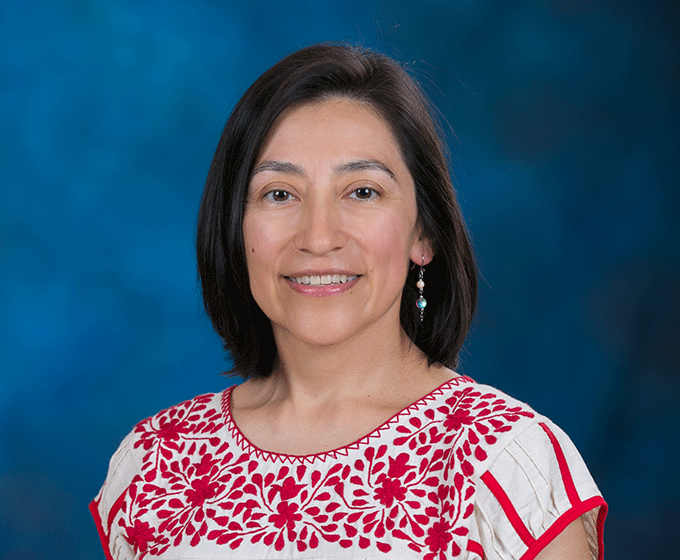
JULY 31, 2024 — A short-lived yet intense controversy that unfolded over four days on X (Twitter) is the focal point of M. Sidury Christiansen’s most recent research about the need to expand the definition of transnationalism.
During the Tokyo 2020 Olympic games (carried out in 2021 due to the coronavirus pandemic), two Mexican-born females on the Olympic boxing team publicly accused the Mexican softball team of discarding their uniforms before departing the Olympic village.
Followers amplified the accusations on X, sharing images of clothing adorned with the Mexican flag amongst the garbage. The images sparked an uproar and fueled debate about national pride. The controversy amplified the discourse around what it means to identify with or embody the culture and heritage of a country, in this case Mexican identity or Mexicanness.
Of the 15 players selected by the Mexican Softball Federation to represent Mexico, 14 were born and raised in the United States. Scholars identify them as transnationals: individuals with strong, simultaneous connections to multiple countries and cultures.
Frequently, transnationals maintain ties to more than one country through residencies, businesses and familial connections, resulting in fluid identities and a sense of belonging across borders. However, this identity often leads to marginalization and exclusion by others.

“Transnationalism and transnational identities should be seen in a different way,” said Christiansen, a UTSA associate professor of bicultural-bilingual studies. “We need to move away from a binary of you belong to a single territory, and therefore you have or represent a single symbol, color or language, to you belong to a group of people that have similar specific cultural practices.”
Christiansen expands on her research in transnationalism and the use of language in “’Pochas sin identidad’: Raciolinguistic ideologies in the construction of mexicandad in online spaces,” an article exploring how individuals use language to negotiate their identities, cultures and membership.
Christiansen conducted a discourse analysis on the comments from the boxers’ tweets and the apologies the softball players issued. She analyzed a total of 9,670 comments, which emphasized different aspects of Mexican identity.
Utilizing a social network for this research was significant. Transnational populations use online spaces to reaffirm their identities, connect with similar individuals, and build communities. The ease and accessibility of these platforms allows individuals to navigate areas where they have multiple connections.
Christiansen found that it is common for people to define identities and vie for cultural membership based on their own criteria of language fluency (ability to speak Spanish), skin and/or hair color and other observable characteristics.
Looking at the exchanges on X, Christiansen found comments by many followers who attacked the softball players’ language skills and used misogynistic language to discuss the players’ bodies, sexuality and intellect.
Further analysis of the accusations, apologies, and replies revealed that the softball players struggled with the expectations of representing two countries that have strict and singular ideas of Mexican and American identity. These perspectives portray the players as not Mexican enough or American enough.
Asian American Olympians confronted comparable accusations during the Beijing 2022 Winter Olympics, when Chinese nationals attacked the U.S.-born Olympians when they lost. The attacks that the Asian American Olympians faced about language and identity led to exclusion similar to what the Mexican-American softball players experienced.
Christiansen plans to further investigate how individuals negotiate identities through language, focusing on how English-dominant Mexican Americans navigate their identities within Mexico or when interacting with Spanish-dominant Mexicans.
“A lot of research unfortunately is biased or one-sided,” stated Christiansen, whose article is in the International Multilingual Research Journal. “Researchers often present the side of the U.S. only, and if you only look at that side, it is very easy to judge the other country.”
“Expecting individuals to conform to a rigid ‘one language, one country, one culture’ ideology hinders growth and acceptance of diversity,” she continued. “The Olympics exemplify multiculturalism and multilingualism, which are the global norm. Embracing this reality can benefit U.S. and Mexican societies by acknowledging the multifaceted ways people identify and express themselves. This includes the ability to love and belong to multiple languages, cultures and belief systems simultaneously.”
Christiansen emphasizes the need to expand conversations around transnational identity formation, especially in online forums. Additionally, she advocates for dual language bilingual education in schools as a way of facilitating the sociolinguistic development of Spanish speakers in the United States.
“People move around, they mix, and we are fluid,” explained Christiansen, acknowledging the increasing multiculturalism and multilingualism of the world. “U.S. society in particular does not seem to have a place for transnational identities because we don’t make that place for them.”
UTSA Today is produced by University Communications and Marketing, the official news source of The University of Texas at San Antonio. Send your feedback to news@utsa.edu. Keep up-to-date on UTSA news by visiting UTSA Today. Connect with UTSA online at Facebook, Twitter, Youtube and Instagram.
Move In To COLFA is strongly recommended for new students in COLFA. It gives you the chance to learn about the Student Success Center, campus resources and meet new friends!
Academic Classroom: Lecture Hall (MH 2.01.10,) McKinney Humanities BldgWe invite you to join us for Birds Up! Downtown, an exciting welcome back event designed to connect students with the different departments at the Downtown Campus. Students will have the opportunity to learn about some of the departments on campus, gain access to different resources, and collect some giveaways!
Bill Miller PlazaCome and celebrate this year's homecoming at the Downtown Campus with food, games, giveaways, music, and more. We look forward to seeing your Roadrunner Spirit!
Bill Miller PlazaThe University of Texas at San Antonio is dedicated to the advancement of knowledge through research and discovery, teaching and learning, community engagement and public service. As an institution of access and excellence, UTSA embraces multicultural traditions and serves as a center for intellectual and creative resources as well as a catalyst for socioeconomic development and the commercialization of intellectual property - for Texas, the nation and the world.
To be a premier public research university, providing access to educational excellence and preparing citizen leaders for the global environment.
We encourage an environment of dialogue and discovery, where integrity, excellence, respect, collaboration and innovation are fostered.